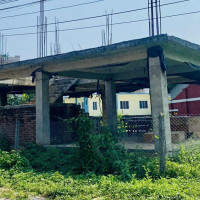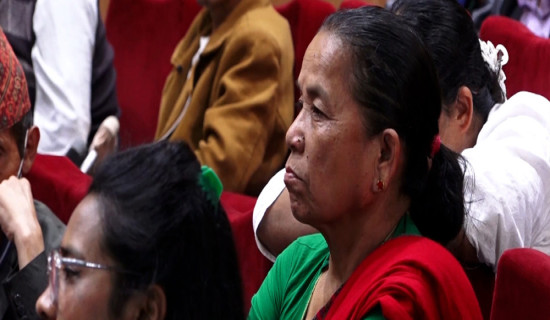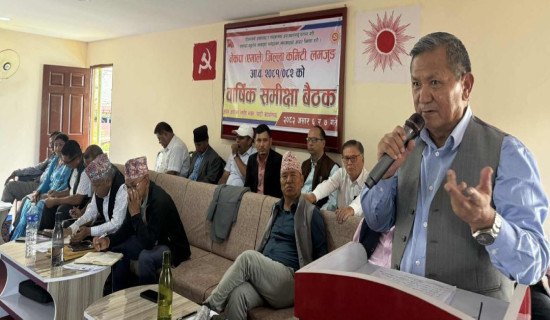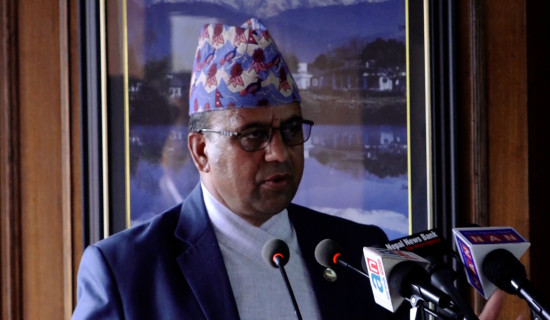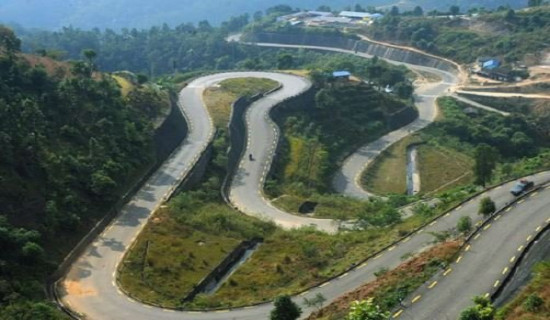Located near the border with India, Ilam’s Suryodaya Municipality gets its name from the beautiful sunrise (Suryodaya) people can view from Antu. The municipality is also known as the land of tea as it produces the highest quantity of tea in the district. It also attracts a large number of tourists, which is why the government of Koshi Province has declared it a tourist town. Suryodaya also holds the title of a child-friendly municipality. The local level is also on a drive to become paperless and has begun delivering its services through the internet without the need for written applications and bulky files.
You are currently in the second year of your second term. What has Suryodaya achieved in your time in office?
We did a lot of work in our first term and have also completed a year of our second term. Currently, we are working to achieve 16 goals that we have outlined for sustainable development. And we have developed a special Suryodaya Development Model to internalise and achieve those goals. We have made great strides in economic development too. My team’s focus on implementing large projects has started to bear fruit.
How are development projects moving forward?
As we were a new municipality, our wards did not have office buildings to work from. We built them to enable efficient and effective service delivery. We are building all-weather roads to give every ward access to reliable round-the-year transportation. We have formulated a 28-year plan to construct top-notch roads in the municipality. We have built a 15-bed decently equipped hospital. More hospitals are under construction.
We have prioritised education and agriculture too. Of the 753 local levels in the country, I believe we are the first and only local level to have brought sex-sorted semen from Canada to help farmers produce female calves with 90 per cent accuracy. We have also focused on mechanising and commercialising agriculture for greater and more profitable yields.
Furthermore, many programmes have been implemented to expand access to electricity and drinking water and to develop tourism infrastructure.
It is unfortunate that despite being called the tea capital of the district, Suryodaya Municipality has not been able to develop its tea sector. Why is that and what must be done to change it?
To simplify a very complicated issue, tea cultivators and entrepreneurs do not adhere to the required standards. The international criterion is for tea plants to have one bud and two leaves. But neither the farmers nor the sellers pay any heed to this. They feel that they must be able to sell tea of any quality with any number of leaves.
Another problem is the idleness of the National Tea and Coffee Development Board. It has taken no initiative to control quality, assist processing and support international marketing of our tea.
Similarly, there is no agency to regulate labour practices in this sector and to ensure that the people working get a fair wage.
Many of these problems can be solved by raising awareness. We must make farmers and traders aware that their tea will find good markets if they follow the global standards. Also, the provincial and federal governments must pay more attention to this sector. The local level can only do so much. Nevertheless, we are currently working to establish a Tea Testing and Research Centre, which will be the first of its kind institution in the country.
The province has declared Suryodaya a tourist town. Has that translated to any programme for tourism development?
The provincial government made the declaration and that was about all it did. To date, we do not have a strategic plan. What are the aims of the province government? What does it hope to achieve and what actions should we carry out? It is not clear. If the province cannot make a plan, then we believe the federal government should step up and devise one. We need a comprehensive master plan to develop tourism here.
The provincial government declared us a tourist town but when we followed up on it, we were told that this was merely a title they intended to ‘award’ to a different municipality every year.
But we are not discouraged. From our side, we are presently building a glass bridge in Kanyam to lure visitors, especially Indians. We are constructing trekking and cycling routes and beautifying Kanyam and Antu. Our efforts have yielded tangible results.
This city holds great potential for agriculture and animal husbandry. What are you doing to develop these sectors?
This municipality has been exporting a considerable quantity of dog chew (treats made to be chewed on by dogs for stimulation and boredom relief) to the United States of America and Canada every year. We are also in talks with various embassies, government agencies and businesses to send it to Europe. But, if we are to send dairy products abroad, we must eliminate Foot and Mouth Disease from our municipality. We aim to do this within the next four years and have made an action plan. We have already begun setting up animal quarantines, rolling out vaccines, distributing cow mats and improving cowsheds.
In agriculture, our focus is on developing the tea sector. We used this year’s International Tea Day as an occasion to initiate the auction system for the selling and buying of tea. This means that those who produce quality tea will have no problems finding high-paying buyers.
The second most grown crop here is Chayote. We used to have trouble selling it to India because it was not included in the country’s quarantine list. But that was resolved this week. After continually lobbying the federal government and holding multiple rounds of talks with the Indian embassy in Nepal, the municipality has finally got the vegetable enlisted in India’s quarantine list. This shall facilitate the sale of nearly 5 million kilograms of Chayote that our municipality exports to India every year.
Moreover, we are building a large agricultural produce collection centre in Kanyam to allow farmers to sell all their crops from one place.
What shall the coming fiscal year’s budget focus on?
It will focus on education. We plan to establish a research centre to allow for the practical learning of science. The budget will also introduce a compensation scheme for the farmers who have lost cattle to the lumpy skin disease. It will prioritise senior citizens and incorporate new projects based on our overarching periodic plan.
How do the federal and provincial governments coordinate with the local level?
The provincial government is itself confused. The local levels have not been able to feel the presence of the province. It should have discussed its budget with us, but it did not. Except for a few partnership projects, there is no coordination with the provincial authorities.
The federal government, too, has ignored the local levels. It should have formulated policies but it seems distracted.
What will Suryodaya have achieved by the end of your second term?
The agriculture will have become modernised and commercialised. There will be no muddy roads. Tourism and education will be at higher levels than they are now. The municipality will have become prosperous.








